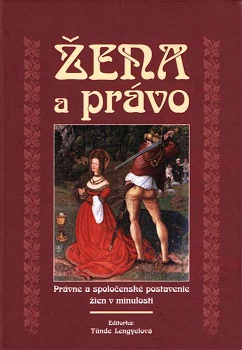Život rané novoveké šlechtičny v českém království (právní limity a skutečné možnosti)
Life of a Noble Woman in the Czech Kingdom in the Early Modern Period (Legal Limits and Opportunities)
Author(s): Marie Ryantová
Subject(s): Gender Studies, History of Law, Criminal Law, Civil Law, Modern Age, Culture and social structure , Canon Law / Church Law
Published by: Historický ústav SAV
Keywords: Czech Kingdom; early modern period; noble woman; law; property; criminal law; canon law;
Summary/Abstract: The position of women was under the strong cultural influence. One of the factors that to a large extent determined lives of many women was the law. The law, however, reflected the division of society into classes or estates. There are obvious differences between legal position of men and women in the Roman, German, Slavic and that means also in Czech law. The fact that women had restricted rights was a consequence of the exercise of the rights of her father, husband or guardian and did not stem from the fact that she was a woman. The canon law was another factor that strongly influenced the life of a woman. According to the canon law the man was the head of the family who decided about children and was legally responsible for crimes committed by his wife and children. It was out of question that a woman should hold an office. The Czech law recognised three forms of guardianships: 1) natural (a relative or a guardian by statute), 2) appointed by the father and recorded in land registers or in authorisation Setter, 3) commissioned by the king. Restricted legal competence of women was most obvious in the sphere of contracting marriages. A woman or a girl, unless she was a widow, could not make a choice of her future husband, but fully depended on the decision of her relatives, mainly father, brothers or her male guardians. Property rights in Czech lands were based on an old institution of the indivisible part of patrimonial property. The father of the family was in charge of this indivisible part. The only situation when a woman could be in the same position was when there was a lack of male relatives. There were, however, differences in the rights of sons and daughters to this indivisible part of patrimonial property. Once married, a woman did not loose her legal competence, nevertheless her property rights were restricted and subordinated to her husband. Originally the entire woman's possession that she brought to the matrimonial home became her husband's property, but she could allot herself some part of it as her own. She had at her disposal three kinds of property: 1) dowry (dos), trousseau, a gift from her husband after the wedding night (dotalicium) - these were given to her as her share of patrimonial property and as a portion that she was entitled to in case of her husband's death, 2) other property that she was either given or inherited and 3) property that her husband allotted to her. The legal limits for women were the most striking in the area of hereditary rights. It was not so much discrimination as the old family tradition in the old Czech law, i.e. to maintain the indivisible patrimonial property in the family. It was necessary to restrict a woman's birthright after she married to avoid reduction of the family property. Single woman or a widow could act in front of court independently as accuser or accused without a guardian. Procedural competence of a married woman was limited and she was considered 'a prisoner of her husband'. She could not administer the property and therefore was not able to sue anybody. There were several rights that women in the Czech kingdom were not denied and according to the law they could use them in the same way as men. Moreover, in some instances their position was more advantageous than that of men. It was the result of the general attitude to women as 'the weaker sex' and their supposed lack of experience and ignorance. Some of these rights, however, were granted to women just theoretically, either because they could be exercised only under exceptional circumstances or because women were not aware of their rights or did not dare to lodge their claims.
Book: Žena a právo. Právne a spoločenské postavenie žien v minulosti
- Page Range: 106-117
- Page Count: 12
- Publication Year: 2004
- Language: Slovak
- Content File-PDF

